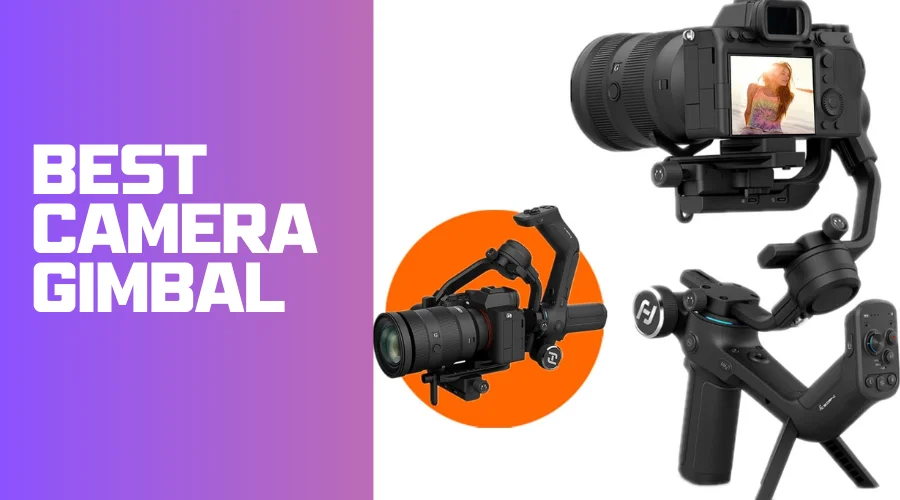The camera gimbals are a valuable tool to get rid of unwanted shaking. It stabilizes the camera during photography. A camera gimbal usually has motorized axes o steady the camera. Most of the gimbals have 3 axes. These axes are typically known as pitch, roll, and yaw.
Pitch can move up and down, roll from side to side, and yaw from left to right. Also, a handle or grip allows the user to control the camera. Thus, gimbals remove vibrations, jitters, and shaky footage by actively adjusting and counterbalancing the camera’s movements.
Moreover, different types of camera gimbals come at different prices. You must get the best one that suits your device and purpose. So, if you are looking for the best camera gimbal, you are at the right place.
What to consider in buying a Camera Gimbal?
Camera gimbals come in different sizes and qualities. You need to consider a few things before buying one for your camera. Here are some key points to keep in mind:
- Payload Capacity: Consider the weight of your camera setup, including the camera body, lens, and any accessories.
- Stability and Smoothness: Look for a camera gimbal with excellent stabilization capabilities.
- Battery Life: Consider the gimbal’s battery life, especially if you plan to use it for extended periods.
- Compatibility: Ensure the gimbal is compatible with your camera model.
- Control and Modes: Look for a gimbal with various control options and shooting modes.
- Portability and Weight: Consider the portability of a camera gimbal, especially if you plan to use it for travel or on-location shoots.
- Price and Budget: Determine your budget for the camera gimbals and explore options within that range.
- User-Friendliness: Evaluate whether the gimbals are user-friendly, especially if you’re a beginner or new to using a camera gimbal.
- Reviews and Recommendations: Before finalizing your purchase, read customer reviews and seek recommendations from photographers or videographers.
12 Best Camera Gimbal in 2023
My team and I have examined hundreds of gimbals in preparing this list. These 12 gimbals are the most popular among the users, and we have also found them efficient.
Fantaseal DSLR Camera Camcorder Phone Stabilizer


Fantaseal DSLR stabilizer is the best camera gimbal for Video bloggers! This -handed hydra stabilizer is suitable for both indoor and outdoor videography. Also, its lightweight( 0.9 pounce) allows low-angle camera moves such as snowboarding, skateboarding, and even boating experiences.
Moreover, it is a versatile gimbal. It allows attaching a camera, a smartphone, and sometimes both. And you can shoot for a long time without putting strain on your hands with the sturdy ergonomic grip.
With this gimbal, you can attach microphones and LED flashlights at a suitable position. However, the drawback of this tool is the low payload. I do not recommend this one for the heavy and professional cameras.
Pros
- Versatility
- Stability
- Adjustable Mounting Platform
- Ergonomic Design
- Compact and Portable
Cons
- Low Payload Capacity
- Limited Features.
- Durability
- Balancing and Setup.
- Compatibility
DJI RSC 2 | Best Mirrorless Camera Gimbal


The DJI RSC 2 is the best mirrorless camera gimbal. It is the compact gimbal you may need for professional video and photo shooting. The folding design of DJI RSC 2 allows easy storage and low-angle shooting mode. Moreover, the OLED display makes photography easier.
The DJI RSC 2 has new Titan stabilization algorithms, providing more stabilization than the other gimbals. And a 3Kg payload is compatible with mirrorless cameras and DSLRs. Professionals who have big lenses can also use this gimbal. In addition, the 14-hour battery life places it at number 2 on the list.
Pros
- Excellent Stabilization Performance
- High Payload Capacity
- Versatile Shooting Modes
- ActiveTrack 3.0
- Focus Control
- Compact and Portable
Cons
- High Price
- Learning Curve
- Battery Life
- App Dependence
DJI RS3 Pro | Long-lasting Gimbal


DJI RS 3 Pro has added a new functionality and load capacity dimension. This is an easy-to-use, long-lasting gimbal that you can use to get super steady photos. It is the advanced version of RS 2 and is specially designed for DSLRs. It is a popular camera Sony gimbal.
Moreover, RS 3 Pro is large enough to support a Canon C70 video camera or a large DSLR, even with heavy lenses, and it can fit midsize cinema cameras like the Sony FX6 or RED Komodo. The carbon-fiber body of this camera gimbal weighs only 2.5 pounds while having this much power.
The DJI RS 3 Pro allows 360-degree rotation on all exes. It is the best camera gimbal DJI. So, you can easily switch between modes such as Pan Follow, Pan and Tilt Follow, and FPV (First Person View). You can control the gimbal with a 1.8-inch OLED screen. This screen is also touchable, which makes handling relatively easy.
Pros
- High load capacity
- The large, full-color OLED touchscreen interface
- Extensive sports and accessory points
- Fine-tuning knob on the tilt axis
- High battery life
Cons
- Expensive
Roxant Pro Video Camera Stabilizer


The Roxant Pro is a high-quality video camera gimbal. Also, the reason for becoming popular is its low weight. You can shoot videos more extended without putting strain on the hands.
Also, it has a very comfortable grip which makes videos more stabilized. The Roxant Pro features superb balance, and a lifetime guarantee covers your purchase. Because it provides good performance at an affordable price, this gimbal stabilizer is the most popular one on Amazon.
Pros
- Compact and Lightweight.
- Affordable Price
- Very Smooth Video Stabilization
- Simple Operation
- Compatible with lightweight cameras, smartphones, and action cameras.
Cons
- Require Manual Balancing
- Limited Payload Capacity
- Limited Features Which Offer Basic Stabilization
- Arm Fatigue
- Limited Compatibility with Larger Cameras
DJI Osmo Mobile 6 | Gimbal for Phones


DJI Osmo Mobile 6 is a 3-axis stabilization gimbal for phones. This integrated technology eliminates unwanted shaking and makes the footage more stable and smoother. Osmo Mobile 6 is easy to use, just unfold and magnetically snap-in. Then the DJI Mimo app launched. Tap on it to open, and you are set to start shooting.
Moreover, this gimbal has ActiveTrack 5.0 technology, keeping the subject in the center frame. Getting low-angle shots with Osmo Mobile 6 is easy as the design is compact and extendable. Also, you will get a simple guide to handle this stabilizer and one-tap editing features. Thus, it allows editing from anywhere.
Pros
- Helpful guideline
- Zoom/focus wheel
- A large and extendable selfie stick
- DJI Mimo app to get advanced control
Cons
- The Zoom wheel is too sensitive
- Exclusively designed for iPhone
Zhiyun Weebill 2 | Mid-tier Camera Gimbal


Zhiyun’s Weebill is a mid-tier camera gimbal DSLR. You can also use it with mirrorless cameras. The 7.7 pound load capacity allows using heavier lenses without worrying about shaky shots. In addition, the 2.88-inch color screen allows you to customize the settings and shot monitoring easily.
Moreover, it provides a wheel to control focus, aperture, and ISO if you use a compatible device. The ergonomic design also allows shooting for a more extended period. You can use this gimbal to shoot quickly at high and low angles.
Zhiyun’s Weebill launches a smartphone app when you have paired your smartphone with it. Thus, you can monitor and adjust balance checks, modes, and remote camera triggering.
Pros
- 2.88-inch flip-out color touchscreen
- High load capacity
- Compact design
- Affordably price
Cons
- Shorter battery life (9 Hours)
- It is not compatible with mid-size cinema cameras
Zhiyun Crane 3S | Cinema Cameras


The Zhiyun Crane 3S is for heavy camcorders and cinema cameras. It carries up to 14 lb (6.5 kg) weight. The design is also ergonomic, with adjustment wheels and an OLED screen to handle the gimbal smartly.
However, the gamble’s large dimension could be more suitable for DSLRs or mirrorless cameras. This heavy-duty gimbal can provide 12-hour battery life and is not so expensive compared with other devices of the same specs. But some drawbacks are available like it is not built with carbon fiber. Also, there is no touchscreen operation, which is also a negative point.
Pros
- Heavy Payload Capacity
- Stabilization Performance
- Advanced features like motion control, follow modes, and time-lapse capabilities.
- Versatile Design
- Long Battery Life
Cons
- Large and heavy gimbal
- Steeper Learning Curve
- Price
- Arm Fatigue
- App Dependence
Feiyu SCORP C | Compatible With Canon EOS R Series


Feiyu Scorp C weighs only 2.5lb, and the payload is around 5lb. It is a three-axis camera gimbal suitable for mid-tier cameras. This tool is compatible with the Canon EOS R Series, the Sony a7 III, the Fujifilm X-T5, and the Nikon Z7 or Z7 II.
Moreover, the Feiyu Scorp C is a sturdy aluminum alloy built and easy to set up. The versatile design allows using different types of devices with this gimbal.
Several options are available to control the Feiyu Scorp C, such as buttons, a joystick, or an OLED touchscreen. Also, you can trigger the camera with a cable when it is attached to the gimbal. That’s why you will not feel the absence of a smartphone app to control the camera and the gimbal.
Pros
- Balance and setup are much simpler
- The underslung grip feels good
- For control, a redesigned center is preferable
- Amazingly steady and fluid
- Excellent 1.5-hour USB-C quick charging time
Cons
- Weight has a significant influence on camera life
- The user cannot change the battery
- Only 365-day warranty
- The app requires A LOT of work
DJI Pocket 2 | Camera Gimbal Stabilizer


You can call it a camera that has an attached gimbal. It is an awesome gimble for getting stable footage. The camera features a 20mm equivalent fast f/1.8 lens and a 1/1.7-inch CMOS sensor. It records in full HD, 2.7K, and 4K DCI (3840 x 2160), all at 24/25/30/48/50/60 frames per second.
Here you will get different photography and video shooting modes, including HDR video, time-lapse, motion-lapse, and hyper-lapse. Moreover, it has two built-in microphones and microcards.
You can transfer the footage from the Pocket 2 to your phone with the DJI app. You may need Wi-Fi or a USB cable connection. This is top-class gear for video shooting. Also, you can use different accessories to make your video shooting experience much smoother.
Pros
- High-quality 4K camera
- Multiple video shooting modes
- 1 hr and 20-minute runtime per full charge
- Easily fit in a pocket, so you can carry it wherever you want
Cons
- Camera is unchangeable
- No option for using an extra battery
FLYCAM HD-3000 Camera Stabilizer


FlyCam HD-3000 is a high-quality handheld camera gimbal. It is a three-axis mechanical gimbal like with a cushioned handle. You can use this for professional cameras as well as small cameras. The film industry cameras are the best suited to this gimbal.
The aluminum build makes it sturdy but quite heavy. However, the payload capacity is higher. This is a popular stabilizer loved by both DSLR and camcorder users.
Pros
- Solid construction and durable materials
- Smooth stabilization and reduced camera shake
- Adjustable central post, allowing you to adjust the height and balance the camera
- Versatility
- Comfortable Handling
Cons
- Need Manual Balancing
- Learning Curve
- Size and Weight
- Limited Features
- Arm Fatigue
MOZA ACGN01 Aircross 2 3-Axis Gimbal Stabilizer


It weighs 1.9 pounds (0.86 kg). It supports cameras up to 3.2 kilograms (7 pounds), giving it a much broader range of compatibility. Here you will get Bluetooth connectivity to control the gimbal and the camera from a distance.
Moreover, it offers up to 12 hours of run time per charge. It has features like an intelligent wheel, an imaginative trigger, and an OLED screen. You can shoot different video modes, including Motion Timelapse, Panorama shooting, and Motion Control.
Pros
- A 3-axis stabilization system that provides smooth and stable footage
- A decent payload capacity
- Advanced features such as following modes, time-lapse, and motion control.
- Relatively compact and lightweight
- Long Battery Life
Cons
- Have a learning curve for balancing, operating, and utilizing.
- Balancing and setup
- Limited payload capacity for heavier setups
- App dependence
- Limited customer support
Manfrotto MVG300XM | Professional Camera Gimbal


The 300XM could be the solution if you’ve been having trouble finding a gimbal that can easily support a DSLR (or mirrorless camera) with a big lens. You can carry out fluid pans, tilts, and tracking movements with your standard DSLR equipment. However, you could discover that your arm starts to hurt rather rapidly.
Pros
- Hold up to 3.4-kilogram
- Touchscreens switch between modes
- Features the Gimbal 300XM app
- Remote control with a handle that may be removed
- Case to carry
Cons
- Slow charging (2.6 hours)
- Readjusting with a few zooms
Final Thoughts | Camera Gimbal
Here I have provided the best possible options for the market. You should learn about these gimbals in detail and compare the prices between them. As you know what is your purpose in using a gimbal, so select the one that suits your needs.
Read Our Latest Articles-
- How to Convert YouTube to MP3: 10 Best Easy Methods
- 15+ Best Trendy Graphic Hoodies for Men & Women
- 12 Best 3 Point Slinger for Camera
FAQ | Camera Gimbal
What is the best gimbal for smartphones in 2023?
The top pick among the top 12 cameras and phone gimbals for 2023 is the DJI OM 5. According to recommendations, it is a need for everybody who uses their smartphone to create media.
What is the best gimbal stabilizer for the camera?
There are different types and qualities of camera gimbals available. You need to pick the one compatible with your camera and best for your needs. The above-mentioned gimbals are the current best in the market. You can choose any of them.
Which is better camera gimbal or stabilizer?
The price and sensitivity of gimbals may be higher than those of conventional video stabilizers. Some filmmakers claim that because gimbal balance must be done manually, it takes longer to set up a gimbal.











